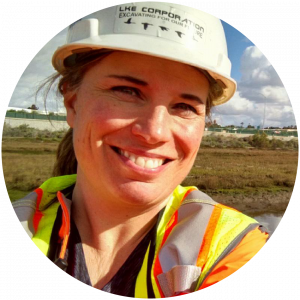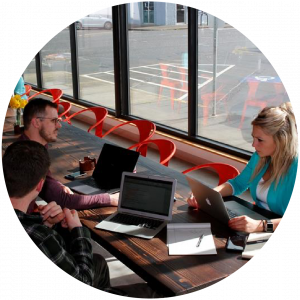Historically, women in the workforce have faced disparities in employment, wages and leadership attainment. The COVID-19 pandemic of the past two years has exacerbated these preexisting inequities. Despite these obstacles, women across Southwest Washington continued to excel in leadership roles in high-demand and high-growth sectors.
Suba Jagannathan, Owner, Mirus Toys
 The manufacturing sector in Southwest Washington employed 20,288 people in the fourth quarter of 2020. Of those, only 5,204, or less than 26% were women. Men in this high-pay sector made an average wage of $68,645 while women trailed at $43,907. While the industry remains dominated by men, women like Suba Jagannathan, Owner of Mirus Toys in Vancouver, WA, are challenging the norm.
The manufacturing sector in Southwest Washington employed 20,288 people in the fourth quarter of 2020. Of those, only 5,204, or less than 26% were women. Men in this high-pay sector made an average wage of $68,645 while women trailed at $43,907. While the industry remains dominated by men, women like Suba Jagannathan, Owner of Mirus Toys in Vancouver, WA, are challenging the norm.
Mirus Toys is a team of five women that design and manufacture hand-crafted wooden toys and educational materials. A computational biologist by training, Jagannathan began making toys for her daughter and launched Mirus Toys in 2016.
For Mirus Toys, women bring balance, new viewpoints and skills in problem-solving to the workforce. “Women bring a fresh perspective to any business,” Jagannathan said. “We excel in balance – balancing jobs, kids, home, everything. We bring innovative solutions to problems and our leadership style is cooperative, fostering a family-like team environment.”
Jagannathan empowers her employees by offering a flexible schedule. Her team makes their own schedule based on their personal and family needs. The company provides full benefits and a retirement plan with employer contribution.
Despite its growth and success, through the years Mirus Toys has faced challenges. Jagannathan did not have business experience prior to launching the company, which made business operation complicated to navigate on her own. Jagannathan’s wish for her company is to find a mentor to bounce ideas off and gain business guidance. During the COVID-19 pandemic, Jagannathan had to navigate the uncertainty of sales coupled with a fixed overhead.
In addition, Jagannathan has faced bias working in the male-dominated woodworking industry. When starting out, she was not taken seriously by machinists, vendors and other experts in the industry. As she has blazed her path in the industry, she has gained the respect of the vendors with whom she works. However, it remains an uphill battle with those outside of her immediate network. Despite this, Jagannathan’s accomplishments speak for themselves.
“The ceiling is there, and it is thick. But you can and should shatter it by persevering.”
– Suba Jagannathan, Mirus Toys
Jagannathan has been in contact with the WSW business services team to learn about options and opportunities the workforce system can provide to support companies and looks forward to working with WorkSource when hiring her next team member.
Jagannathan urges women to trust their creativity and not to expect success to come easy. For Jagannathan it has been a hard journey, but the love of her job and industry makes up for it. She loves to see a child’s eyes light up as they play with a Mirus toy.
Kim Erion, President and Lead Ecologist, LKE Corporation
 The gender inequalities in the construction industry in Southwest Washington mirror those of the manufacturing industry. In construction, only 20.13% of jobs (3,472 positions) are held by women, while men dominate at 79.87% of the industry (13,772 positions). Similarly, men in the construction industry make an average of $66,276 whereas women make $49,299. Despite this, another bold female leader that is challenging gender disparities and biases is Kim Erion, the President and Lead Ecologist at LKE Corporation in Washougal, WA.
The gender inequalities in the construction industry in Southwest Washington mirror those of the manufacturing industry. In construction, only 20.13% of jobs (3,472 positions) are held by women, while men dominate at 79.87% of the industry (13,772 positions). Similarly, men in the construction industry make an average of $66,276 whereas women make $49,299. Despite this, another bold female leader that is challenging gender disparities and biases is Kim Erion, the President and Lead Ecologist at LKE Corporation in Washougal, WA.
LKE is a full-service restoration contractor in heavy construction. Since 1993, the team has completed more than a thousand miles of watershed restoration, hundreds of miles of major instream restorations including the Toutle River, Oaks Bottom Wildlife Refuge box culvert with channels in Portland and miles of channels and hundreds of acres of wetlands.
For Erion, having women in leadership roles is important to provide balance and compassion to the workforce. She strives for a diverse workforce, acknowledging the unique assets that both men and women bring to her company.
A certified Women’s Business Enterprise (WBE), among other designations, Erion has noticed that federal customers recognize that WBE firms have an intense attention to detail and a drive to do an extraordinary job. “WBE’s that don’t stop until they are acknowledged will always be rewarded for their efforts,” Erion noted.
With a strong resolve, LKE has faced challenges throughout its 29 years in operation. Like many companies, LKE is facing issues recruiting qualified applicants for available job openings and with employee retention. LKE has used WorkSource to help with immediate hiring needs and participated in hiring fairs.
As recently as 2020, Erion has faced gender bias from men in her industry. “Every day you have to prove yourself – it never ends,” Erion said of the barriers of being a woman in leadership in the construction sector.
“Be absolutely sure of WHY you are in the industry! What drives you? Be confident and are you real? You have to be honest about that and be true to your goals.”
– Kim Erion, LKE Corporation
For women interested in leadership positions, Erion suggests they seek knowledge. “… know more than your male competitors,” Erion said, “and if you don’t know –ask, learn – do not be afraid.” She recommends women seek out work, answers and problems to solve.
Sarah Laughlin, Director of Human Resources, Fuel Medical Group
 In contrast to the construction and manufacturing sectors, women dominate the healthcare and social services sector in number of employees. Women occupy 79.58% of jobs (26,310 positions) while men hold 20.41% of job (6,749 positions) in the industry. Despite this, wage inequalities still exist in the industry, with men making an average wage of $57,269 while women make an average wage of $41,844. Sarah Laughlin, Director of Human Resources at Fuel Medical Group shares her experience as a leader in the industry.
In contrast to the construction and manufacturing sectors, women dominate the healthcare and social services sector in number of employees. Women occupy 79.58% of jobs (26,310 positions) while men hold 20.41% of job (6,749 positions) in the industry. Despite this, wage inequalities still exist in the industry, with men making an average wage of $57,269 while women make an average wage of $41,844. Sarah Laughlin, Director of Human Resources at Fuel Medical Group shares her experience as a leader in the industry.
Founded in 2010, Fuel Medical Group is the leading business advisory company serving hundreds of audiology and ear, nose and throat practices across the nation. Fuel Medical Group focuses on three areas, medical practice support to support growth, tailored revenue growth support and intentional patient engagement. Across Southwest Washington, Fuel Medical Group provides services to ear, nose and throat (ENT) practices, audiology practices, hospitals and medical centers and university clinics.
Before joining Fuel Medical, Laughlin spent five years in the Air Force and has spent her career in the Human Resources field. At Fuel Medical, she has valued being given space to learn, share her opinions and challenge traditional thought.
Fuel Medical Group values diversity throughout their team. “Diversity, whether gender, or race or other factors, has been studied and found to positively impact the bottom line of businesses,” said Laughlin “If you can analyze a problem from many different perspectives, you will get a better product, service, solution. If a business wants to be successful, why wouldn’t you follow those outcomes?”
“Our objective is to empower all staff to creatively problem solve for our clients. That is not exclusive to a gender, but I can say that most of our committees for internal and client engagement are led by women. They are smart, thoughtful and highly creative. I feel very fortunate to work with a great group of women – and that includes my volunteer life as well.”
– Sarah Laughlin, Fuel Medical Group
The co-owners of Fuel Medical Group are also co-owners in Grains of Wrath Brewpub. During 2021, many restaurants, including Grains of Wrath, experienced worker shortages. In response to this, local businesses partnered with WorkSource and Workforce Southwest Washington to create a Prep Cook Bootcamp. The businesses worked with WorkSource and the Next youth career center on candidate recruitment and then turned the program over to a restaurant industry veteran to conduct the actual education. The first course took place in November 2021, where 12 people got industry training and help finding new jobs. Training for the second cohort will take place in March 2022.
Laughlin’s advice to women in the workforce is to be curious about your industry and how your role impacts revenue and expenses. “Knowing that, and the operation, in addition to your specific area of expertise, is the surest way I have found to be successful. Everyone, from the most entry level to the most senior role, has the opportunity to impact the bottom line,” Laughlin said. “Every role can matter. Be inquisitive, ask questions.”
Workforce Southwest Washington is committed to promoting equity through our grants, contracts and services. Guided by our strategic plan, WSW continues to push to advance equity for women and other individuals from historically-excluded communities.
Through changes to language in contracts and requests for proposals, targeted outreach and process changes, WSW strives to increase access to and outcomes from workforce services for women and other individuals from historically-excluded populations.
Is your company looking for workforce services or support?
Contact Darcy Hoffman, Director of Business Services at dhoffman@workforcesw.org or 360.608.4949 or submit a request and we’ll contact you.
In addition, we currently have grants available for employee training leading to quality jobs and workplace equity. Learn more and learn how to apply here.



